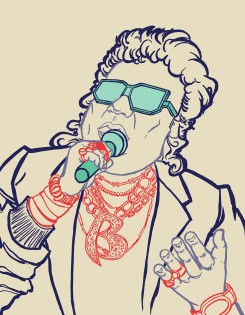You may not realize it, but you’ve probably heard a Bappi Lahiri song. Regardless, the melodies of some of his biggest songs will sound familiar — more than a few of them lift sections of American pop hits. Lahiri, an Indian soundtrack composer who hit his peak during the 1980s, is responsible for some of the music now automatically associated in the West with Bollywood. Kitschy synthesizers, lush string arrangements clashing with Hindi vocals recorded loud and distorted, drum machines competing with traditional percussion, and blaring horn sections, danced out in front of glittery backdrops — all Bappi Lahiri hallmarks.
Even if Lahiri’s popularity at home and the lyrics of his music make it somehow representative of India, to think of it as intrinsically tied to India’s classical traditions would be a mistake. His songs are a complete fusion, injecting 1970s and 1980s Western pop into the Indian film industry. Lahiri’s biggests hits, like the soundtrack to 1982’s Disco Dancer and 1984’s Kasam Paida Karne Wale Ki, were released in an era when socialist India was still mostly closed to outside business and investment. By referencing or even directly plagiarizing foreign music, Lahiri brought new genres and instrumentation into India at a time when they might otherwise not have made it in.
In this one-sided conversation, Lahiri took elements from pedestrian pop and disco songs, and put them to use in completely different settings. The brilliance in Lahiri’s theft was his ability to create new songs from trashy old material by stretching playtimes, adding new layers, and radically changing mood and energy. “Mere Jaisa Mehbooba” from 1984’s Baadal adds female vocals to Herbie Hancock’s robotic hip hop song “Rockit” to build it into something seductive and creepy at the same time. “Jimmy Jimmy Jimmy Aaja” from Disco Dancer steals its structure from a piece by French disco duo Ottawan, but strings, plaintive vocals, and a more propulsive drum machine groove take the song far beyond its inspiration. “Everybody Dance With Me” (from a 1978 B-movie named College Girl) tears the riff from “In-A-Gadda-Da-Vida,” and lands it in a glammy stomp, complete with wildly echoing boy-girl vocals. Lahiri’s more original songs are equally thrilling, from the infectious call and response of “I Am A Disco Dancer,” to the relentless bass line and out-of-control synthetic tones of “O Beraham Tune Kiye.”
If Lahiri’s songs had only been popular in India, his story would simply be that of a few good songs and an amusing anecdote on plagiarism. His soundtrack to Disco Dancer, however, was massively popular in Russia and China, indirectly bringing traces of Western culture to the Communist world. Since then, Lahiri’s songs have looped back into North America and Europe. While Lahiri was originally the one taking from foreign music, hip hop producers are now sampling his songs, and songwriters are adopting his aesthetic. M.I.A. repurposed “Jimmy Jimmy Jimmy Aaja” into the track “Jimmy” on her 2007 album Kala, and in 2011 Lahiri claimed that Jennifer Lopez had plagiarized elements of “On the Floor” from his 1990 song “Sochana Kya Jo Bhi Hoga Dekha Jayega.”
Today, Lahiri is an over-the-top, chubby figure, and appreciation of his music can unfortunately focus on its novelty factor. Below layers of flash and outmoded production values, however, the back-and-forth at the heart of his music remains captivating for the way in which he took sounds from the West, presented them back to the world as Indian, and kick-started a global exchange of songs and styles.


